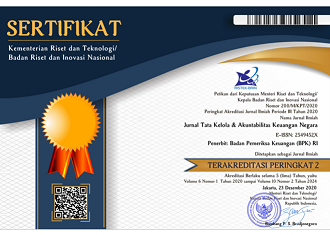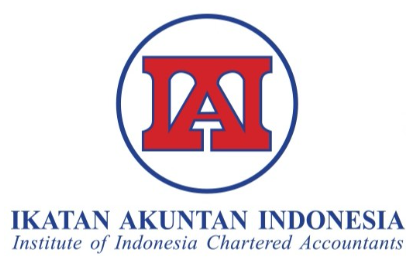Ethics on the line: How obedience pressure shapes auditors’ decisions
DOI:
https://doi.org/10.28986/jtaken.v11i1.1851Keywords:
obedience pressure, professional skepticism, auditor's ethical decisionsAbstract
This study examines the influence of professional skepticism and obedience pressure on auditors’ ethical formulation of audit opinions. Encompassing central and regional offices, 243 auditors from the Audit Board of Indonesia participated in this experimental study. In the scenario, a junior audit manager discovered a misstatement in fixed asset accounts; obedience pressure was simulated by imposing career advancement threats if the auditor did not ignore the error. Binary logistic regression was employed to predict the likelihood of issuing an unqualified audit opinion under different conditions. Obedience pressure significantly reduced ethical decision-making, with auditors more likely to follow superior orders even when such orders compromised ethical standards. In contrast, professional skepticism, as a standalone factor, did not significantly influence ethical decisions. However, its interaction with obedience pressure exhibited a marginal effect, implying that greater skepticism may somewhat mitigate the adverse influence of obedience pressure. These findings highlight the complex interplay between organizational influence and individual traits in auditing practices, as well as the ethical risks faced by professional auditors. The study's novelty lies in its use of practicing auditors as participants, in contrast to earlier research involving students or non-practitioners, allowing for a more realistic assessment of how skepticism operates in actual audit settings.
References
Abdillah, T. R., Setyadi, E. J., Santoso, S. B., & Mudjiyanti, R. (2020). Pengaruh tekanan anggaran waktu, tekanan ketaatan, dan pengalaman auditor terhadap audit judgment. RATIO: Reviu Akuntansi Kontemporer Indonesia, 1(1), 22-36. https://doi.org/10.30595/ratio.v1i1.7972
Abdullah, A., Mazaloomi, S., & Poordadashi, A. (2016). Time pressure, fee pressure, and audit quality. International Journal of New Studies in Management Research, 1(1), 9-12.
Ainayah, I., Yasa, I. N. P., & Sujana, E. (2017). Pengaruh gender, tekanan ketaatan, pengalaman, dan pengetahuan terhadap audit judgment (Studi pada BPK perwakilan Provinsi Bali). E-JIMAT (Jurnal Ilmiah Mahasiswa Akuntansi) Undiksha, 8(2). https://doi.org/10.23887/jimat.v8i2.14600
Anwar, P. H. (2024). Audit dynamics of tenure and client pressure: An auditor independence study. Journal of Accounting and Digital Finance, 4(1), 58-68. https://doi.org/10.53088/jadfi.v4i1.1151
Bazerman, M. H., Morgan, K. P., & Loewenstein, G. F. (1997). The impossibility of auditor independence. Sloan Management Review, 38(4), 89-94.
Beasley, M. S., Carcello, J. V., Hermanson, D. R., & Neal, T. (2013). An analysis of alleged auditor deficiencies in SEC fraud investigations: 1998-2010. Center for Audit Quality (CAQ). http://www.thecaq.org/resources/pdfs/CAQ_deficienciesMay2013.pdf
Bishop, C. C. (2013). The impact of social influence pressure on CFO judgments (Paper 555) [Doctoral Dissertations, Kennesaw State University]. Digital Commons Kennesaw State University. https://digitalcommons.kennesaw.edu/etd/555/
Burnaby, P. A., Howe, M. A., & Muehlmann, B. (2011). Detecting fraud in the organization: An internal audit perspective. Journal of Forensic & Investigative Accounting, 3(1), January-June. https://ssrn.com/abstract=1799742
Chen, Y-H., Wang, K-J., & Liu, S-H. (2023). How personality traits and professional skepticism affect auditor quality? A quantitative model. Sustainability, 15, 1547. https://doi.org/10.3390/su15021547
Chiang, C. (2016). Conceptualizing the linkage between professional skepticism and auditor independence. Pacific Accounting Review, 28(2), 180–200. https://doi.org/10.1108/PAR-08-2015-0034
Chong, V. K., & Syarifuddin, I. (2010). The effect of obedience pressure and authoritarianism on managers' project evaluation decisions. Advances in Accounting, 26(2), 185-194. https://doi.org/10.1016/j.adiac.2010.04.004
Coleman, A. (2006). Dictionary of psychology (2nd edition). Oxford University Press.
Daneshfar, A., & Fahadani, S. H. (2019). Contextual factors, obedience pressure, and accounting decision-making. Journal of Behavioral Studies in Business, 11, 1-9.
Davis, S., DeZoort, F. T., & Kopp, L. S. (2006). The effect of obedience pressure and perceived responsibility on management accountants’ creation of budget slack. Behavioral Research in Accounting, 18(1), 19-35. https://doi.org/10.2308/bria.2006.18.1.19
Donnelly, A. M., Kaplan, S. E., & Vinson, J. M. (2021). The impact of trait skepticism and ego depletion on auditor judgment. Behavioral Research in Accounting, 33(1), 107–122. https://doi.org/10.2308/BRIA-2020-011
Faisal. (2007). Tekanan pengaruh sosial dalam menjelaskan hubungan moral reasoning terhadap keputusan auditor. Jurnal Akuntansi dan Keuangan Indonesia, 4(1), 25-46. https://doi.org/10.21002/jaki.2007.02
Glover, S. M., & Prawitt, D. F. (2014). Enhancing auditor professional skepticism: The professional skepticism continuum. Current Issues in Auditing, 8(2), 1-10. https://doi.org/10.2308/ciia-50895
Hartmann, F. G. H., & Maas, V. S. (2010). Why business unit controllers create budget slack: Involvement in management, social pressure, and Machiavellism. Behavioral Research in Accounting, 22(2), 27-49. https://doi.org/10.2308/bria.2010.22.2.27
Hilbe, J. M. (2015). Practical guide to logistic regression. CRC Press. https://doi.org/10.1201/b18678
Hurtt, R. K. (2010). Development of a scale to measure professional skepticism. Auditing: A Journal of Practice and Theory, 29(1), 149-171. https://doi.org/10.2308/aud.2010.29.1.149
Hurtt, R. K., Brown-Liburd, H., Earley, C. E., & Krishnamoorthy, G. (2013). Research on auditor professional skepticism: Literature synthesis and opportunities for future research. Auditing: A Journal of Practice & Theory, 32(Supplement 1), 45–97. https://doi.org/10.2308/ajpt-50361
Hussin, S. A. H. S., Iskandar, T. M., Saleh, N. M., & Jaffar, R. (2017). Professional skepticism and auditors’ assessment of misstatement risks: The moderating effect of experience and time budget pressure. Economics and Sociology, 10(4), 225–250. https://doi.org/10.14254/2071-789X.2017/10-4/17
International Auditing and Assurance Standards Board (IAASB). (2024). Handbook of international quality management, auditing, review, other assurance, and related services pronouncements. International Federation of Accountants.
Kassin, S., Fein, S., & Markus, H. R. (2011). Social psychology (8th ed.). Cengage Learning.
Linthicum, C., Reitenga, A. L., & Sanchez, J. M. (2010). Social responsibility and corporate reputation: The case of the Arthur Andersen Enron audit failure. Journal of Accounting and Public Policy, 29(2), 160-176. https://doi.org/10.1016/j.jaccpubpol.2009.10.007
Lord, A. T., & DeZoort, F. T. (2001). The impact of commitment and moral reasoning on auditors’ response to social influence pressure. Accounting, Organizations and Society, 26(3), 215-235. https://doi.org/10.1016/S0361-3682(00)00022-2
Manoucheri, F., Peikfalak, J, & Nafchi, H. F. (2023). Prediction of the auditor's professional skepticism based on the ethical climate of the organization and demographic characteristics of the auditor. International Journal of Ethics & Society, 5(2), 58-63.
Maulida, K., & Novianti, N. (2023). Audit experience, independence, and professional skepticism against fraud detection: time pressure as a moderating factor. Asia Pacific Fraud Journal, 8(2), 381-393. https://doi.org/10.21532/apfjournal.v8i2.331
McCrae, R. R., Costa, P. T., & Martin, T. A. (2005). The NEO-PI-3: A more readable revised NEO personality inventory. Journal of Personality Assessment, 84(3), 261–270. https://doi.org/10.1207/s15327752jpa8403_05
Milgram, S. (1974). Obedience to authority: An experimental view. Harper Perennial Modern Classics.
Mirza, A. D., & Khoirunisa, K. R. (2021). Obedience pressure vs peer pressure: an explanation of muslims’ religious role in budgetary slack. Journal of Indonesian Economy and Business, 36(2), 124-135. https://doi.org/10.22146/jieb.v36i2.1771
Muttiwijaya, G. T., & Ariyanto, D. (2019). Pengaruh self-efficacy, skeptisisme profesional, independensi, dan kompleksitas tugasterhadap audit judgment. E-Jurnal Akuntansi Universitas Udayana, 27(2), 1290-1315. https://doi.org/10.24843/EJA.2019.v27.i02.p17
Nelson, M. W. (2009). A model and literature review of professional skepticism in auditing. Auditing: A Journal of Practice & Theory, 28(2), 1–34. https://doi.org/10.2308/aud.2009.28.2.1
Parastika, N. P. E., & Wirawati, N. G. P. (2017). Skeptisme profesional sebagai variabel pemoderasi pengaruh tekanan ketaatan dan pengalaman auditor pada audit judgment. E-Jurnal Akuntansi Universitas Udayana, 18(3), 1800-1830.
Popova, V. (2013). Exploration of skepticism, client-specific experiences, and audit judgments. Managerial Auditing Journal, 28(2), 140–160. https://doi.org/10.1108/02686901311284540
Pratama, B. C., Ahmad, Z. A., & Innayah, M. N. (2018). Obedience pressure, professional ethics, attitude of skepticism, and independence towards audit judgment. Journal of Accounting Science, 2(2), 141-149. https://doi.org/10.21070/jas.v2i2.1238
Public Company Accounting Oversight Board (2024). Spotlight: Insights on culture and audit quality. PCAOB. https://assets.pcaobus.org/pcaob-dev/docs/default-source/documents/culture-spotlight.pdf
Quadackers, L., Groot, T., & Wright, A. (2014). Auditors’ professional skepticism: Neutrality versus presumptive doubt. Contemporary Accounting Research, 31(16), 639–657. https://doi.org/10.1111/1911-3846.12052
Qumaini, A., & Aligarh, F. (2022). Pengaruh pengalaman audit, self-efficacy, kompleksitas tugas, tekanan ketaatan terhadap audit judgment dengan skeptisisme profesional sebagai variabel mediasi. ACE: Accounting Research Journal, 2(1), 1–21. https://journal.feb.unipa.ac.id/index.php/ace/article/view/213
Sari, D. I., & Ruhiyat, E. (2017). Locus of control, tekanan ketaatan, dan kompleksitas tugas terhadap audit judgment. Jurnal Aset (Akuntansi Riset), 9(2), 23-34. https://doi.org/10.17509/jaset.v9i2.9230
Sekaran, U., Bougie, R. (2017). Research methods for business (6th ed.). Penerbit Salemba Empat.
Shirowzhan, H., & Fakhari, H. (2024). Clarifying the decision-making mystery: drivers of professional skepticism, ego depletion, and overconfidence in independent auditors’ quality of judgment. Managerial Auditing Journal, 39(7), 821–842. https://doi.org/10.1108/MAJ-04-2024-4317
Surya, L. P. L. S., & Dewi, C. I. R. S. (2019). Pengaruh tekanan ketaatan pada audit judgment dengan religiusitas sebagai pemoderasi. E-Jurnal Akuntansi, 29(2), 673-682. https://doi.org/10.24843/EJA.2019.v29.i02.p14
Suryarini, T., Yulianto, A., Shovuro, S., & Widiatami, A. K. (2022). Obedience pressure and audit judgment: Does the auditor's personality have a role? Jurnal Kajian Akuntansi, 6(2), 197-210. https://doi.org/10.33603/jka.v6i2.5997
Svanberg, J., & Öhman, P. (2013). Auditors' time pressure: Does ethical culture support audit quality? Managerial Auditing Journal, 28(7), 572-591. https://doi.org/10.1108/MAJ-10-2012-0761
Tanoto, R., & Suputra, I. D. G. D. (2017). Pengaruh obedience pressure, kompleksitas tugas, dan senioritas auditor terhadap audit judgment. E-Jurnal Akuntansi Universitas Udayana, 21(1), 57-85.
van Niew Amerongen, N., Asare, S., van Buuren, J., & Verwey, I. (2024). The effect of pressure sources and trait variables on skeptical audit judgments and actions. SSRN Electronic Journals, http://dx.doi.org/10.2139/ssrn.4756790
Vera-Muñoz, S. C. (2015). Commentary on “The effect of an audit judgment rule on audit committee members’ professional skepticism: The case of accounting estimates” (Kang, Trotman, and Trotman). Accounting, Organizations and Society, 46, 77-80. http://dx.doi.org/10.1016/j.aos.2015.04.002
Verwey, I. G. F., & Asare, S. K. (2022). The joint effect of ethical idealism and trait skepticism on auditors’ fraud detection. Journal of Business Ethics, 176, 381-395. https://doi.org/10.1007/s10551-020-04718-8
Wibhawa, I. W. S., Julianto, W., & Setiawan, A. (2020). Pengaruh kompleksitas tugas, pengalaman, dan tekanan ketaatan terhadap audit judgment. Prosiding Biema Business Management, Economic, and Accounting National Seminar, 1, 1336-1350. https://conference.upnvj.ac.id/index.php/biema/article/view/927
Yulianti., Chandrarin, G., & Supanto, F. (2022). Effect of ethics and professionalism on audit quality: A moderating role of dysfunctional audit behavior. Problems and Perspectives in Management, 20(3), 529-539. https://doi.org/10.21511/ppm.20(3).2022.42
Downloads
Submitted
Accepted
Published
How to Cite
Issue
Section
License
Copyright (c) 2025 Jurnal Tata Kelola dan Akuntabilitas Keuangan Negara

This work is licensed under a Creative Commons Attribution-ShareAlike 4.0 International License.

Jurnal Tata Kelola dan Akuntabilitas Keuangan Negara is licensed under
a Creative Commons Attribution-ShareAlike 4.0 International License





















